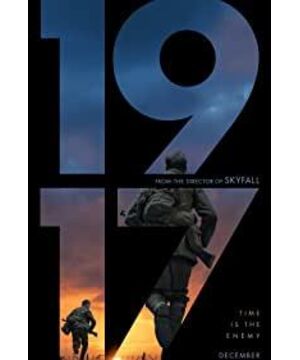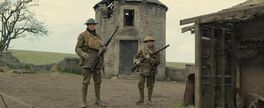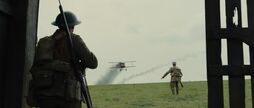1917 is a good movie worth watching. It is for the director's bold attempt in "one shot to the end", the emphasis on the audience's immersive experience, and the director's skilled film language expression. But on the other hand, the two contradictions in 1917 are irreconcilable, one is the logical contradiction in the coherence of the story; the other is between the romanticism of film reality and core realism, and both of these contradictions are related to one mirror to the end. It's related, and there is no "sage time" after watching the film. Can watching a film be conferred? I personally have a simple judgment, to have "sage time".
The first contradiction: Is the story of "1917" good? Two British soldiers were ordered to cross the theater to the front under the command of the general to convey the order to stop the attack. Without it, it’s just such a story, and it’s finished in as little as thirty words. To shoot for a hundred or so minutes, the director will naturally have to give the two male protagonists some 9981 points. The limitation of one shot to the end appears. This method requires the protagonist to keep appearing and not to change people or to switch scenes, but the story is only so long, the beginning and the end are written, but there are still 100 minutes in the middle. It's like stretching dough, holding both ends and stretching continuously. After the critical point, holes will appear in the middle. These holes are the flaws in the plot. and. Looking back at the plot, let’s playfully look at a few examples: (Male 1: tall and thin, older; Male 2: short and fat, younger. Note: the two male protagonists are opposite in height, short, fat and thin)
1. Entering the underground living room of the retreating German army, the man 1 was hungry to search for food and touched the mine lead and stood still. The mine was triggered by a passing mouse and buried in the rubble. After the man 2 dug out with his bare hands, the two were unharmed. .
2. The two rested on the pasture. Two British fighter jets and a German fighter jet exchanged fire in the sky. The German fighter jet was shot down and fell right next to the two male protagonists. By the way, male 1 used a kettle to fill a jug of milk in this ranch, which is useful later.
3. Followed 2, rescued the German pilots, I don't know I thought they were friendly forces, and then the wonderful thing came, male 2 asked male 1 to fetch water for the pilot, just after male 1 finished the water, he turned around, and male 2 was captured. The Germans left with a knife in the waist. Pause for a moment, let's go back to the problem of setting, this time is 1917, the title of the film says, the first World War has been fought for three years, it is okay not to shoot friendly troops, but to capture the enemy also pay attention to the Basic Law, disarm and lay down weapons and deprive them The ability to resist, I don't know where the confidence of the two masters came from, and undefended on the battlefield to rescue a healthy enemy with unknown equipment.
4. No matter, anyway, male 2 will not appear later, just look at male 1. We can skip the male 1 who rushes to the destination in a friendly truck. This is the director's trick. Don't go to the bottom of why the male 2 is still bleeding from the belly of death, and a group of bald heads emerges from the back of the cowshed. Oh no, a team of troops.
5. When he arrived near the destination, the bridge was broken. Male 1 could only wave goodbye and walk through the town alone. In all fairness, this place is still very good. After the male 1 and the German army who sniped him, they all hit the head in the middle of the corridor. The tough thing is that the male 1 has a third-level head but just fainted, and the back of his head fell out of the hole. Behind the door, the Germans did not abide by the safety production regulations and did not wear helmets. It was a matter of course.
6. It is night when you wake up, and the night is even more exciting here. Male 1 was found and chased by the Germans and got into a private house. There was a French woman and a baby inside. Helping to bandage it would be a no-brainer. What does the baby need? This is the open-book question. The milk man 1 in the ranch outfit in front didn't have time to drink two sips. Now the military and civilian families are all going out.
7. After the battle between heaven and man, male 1 still decided to go out to deliver the letter, and the veteran's setting was eaten again. Male 1 saw a pair of German soldiers standing guard at the door, one outside and one inside. Anyone who has played the game understands that now is the best time to sneak in (unparalleled). As a result, Man 1 went up to cover his mouth, and he finally covered his mouth without putting a dead hand. When he was found by the person outside, what he did was to run away. Stepping on the thunder golden bell in front, it is also reasonable for the grass to fly up in the hail of bullets, unscathed.
It is undeniable that this more than 100 minutes of one shot shows the director's sophisticated and adventurous skills and the professional quality of editing behind it. But the plot logic is inconsistent and vague. Do not engage in montage and do not engage in multi-line advancement, and the main line alone is not enough to support a picture of war. With little to see big, no group portraits and no environmental background, the perspective of the two male protagonists alone cannot hold up, not to mention that there is a middle-of-the-road collapse. Naturally, the above obstacles that violated the plot appeared, which made the already less rich plot even thinner.
It is not necessary to be so demanding of plot logic for movies on weekdays, but I chose the type of war movie and used one shot to the end. In the interview, the director claimed that he wanted a better sense of immersion. At the very least, I think it must be the same as reality. It matches. You might be dazzled by the director’s photography skills when you watch it once, but what about twice? What about three times? this is the key of the problem. A food is not good to throw away and eat it and it has no taste. What does Cao Cao call it?
The second part of the contradiction is that the construction is reflected in the unreliable reality of this war, but before that, it is necessary to determine what the core of the director wants to express?
This has to start with another work of the director. "Revolutionary Road" tells the story of a middle-aged couple who put their hopes on the "revolution" in their lives to get rid of the mid-life crisis. "Revolution" is nothing but an escape from real life. The ending is worse than divorce. If you want to know how miserable it is, it is recommended to watch the movie by yourself. The connotation of "1917" is similar. As veterans, the two protagonists don't remember the situation of the last war. It highlights the insignificance of human beings in a large environment. Obviously the director wants to emphasize the nothingness of war and oppose war, which is a good and universal value.
As far as the performance of the plot is concerned, even if one mirror can blow into the sky, it will not change the excessive romanticism in it. The death of male 2 is the contemporary farmer and snake, the encounter of male 1 and the French woman, and the baby is like a trinity. "Father, Son, Madonna", these metaphors would be a surprise if they didn't appear in a war movie, but appearing here will only reduce the sense of substitution in one shot. The reason is very simple. We are here to be soldiers. , not here to be a saint. This also constitutes a very interesting paradox. Those who cannot see the metaphor will feel that the plot here is inconsistent and unnecessary, and seeing the metaphor will reduce the authenticity of the sense of substitution. Just as reality and romance are often antagonistic in sexual relations, so in literary creation.
At this point, I can make my own judgment for 1917: good movie, watch it. But it still has flaws, and the good parts are clear at a glance. The flawed part is what I would like to say more about. The nothingness of anti-war and war is manifested by something more real. The director noticed this and inserted some backgrounds in the shooting, such as corpses in ravines and rivers, corpses hanging on barbed wire, and the mess of war was hidden on the road the male protagonists walked on, but these were all covered by more beautiful scenery. Cover up. And Male 1 shot several times because he was forced into a desperate situation and had to shoot, unlike soldiers like police officers. Discordant reality mixed with veiled romance. To put it bluntly, it is a bit difficult to cover the cruel reality of war and expose only a corner, and hope that this exposed corner will make the meaninglessness and anti-war theme of war manifest.
View more about 1917 reviews











